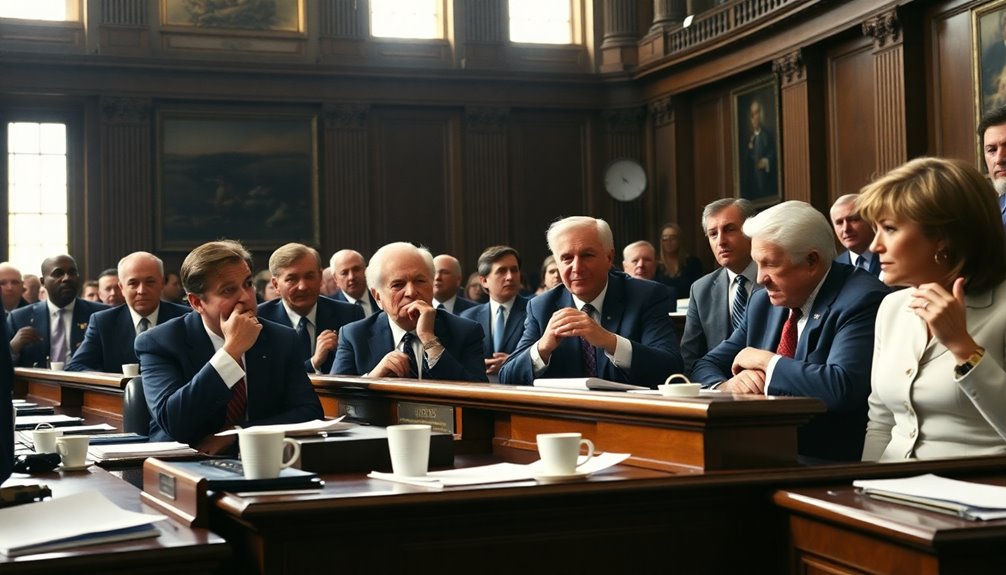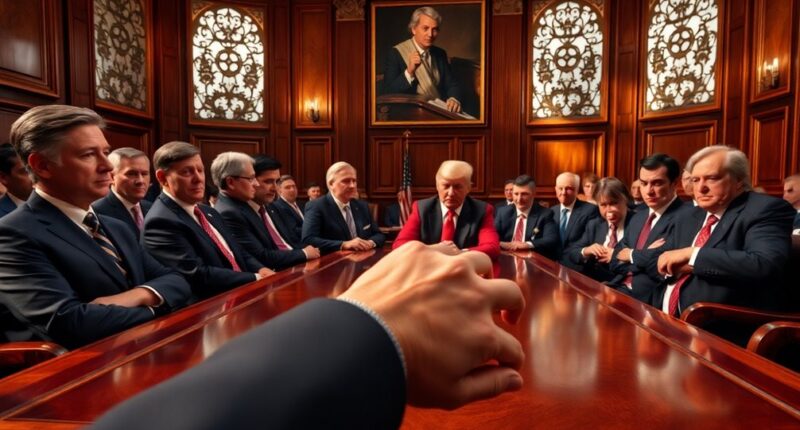The Senate vote on Robert F. Kennedy Jr.'s nomination highlighted stark partisan divides, ending in a tight 52-48 tally. Most Republicans backed Kennedy despite concerns over his qualifications, particularly regarding his vaccine stance. Key figures like Senator Bill Cassidy expressed doubts, while Democrats, led by Senator Elizabeth Warren, fiercely opposed him, citing ethical worries. This vibrant conflict hints at significant implications for health policy and oversight in his administration, leading to intriguing questions about the future.
Key Takeaways
- The final Senate vote on Kennedy's nomination was 52-48, reflecting a deep partisan divide in support and opposition.
- Republican senators predominantly backed Kennedy, while Democrats largely opposed him, underscoring contrasting party lines on healthcare leadership.
- Concerns about Kennedy's qualifications, particularly regarding his vaccine statements, were voiced by GOP senators during the confirmation hearings.
- Senator Elizabeth Warren led the Democratic opposition, emphasizing ethical concerns and potential impacts on healthcare policies stemming from Kennedy's nomination.
- Public reaction to the vote was polarized, with supporters celebrating the outcome and critics fearing implications for healthcare oversight and policy.

As the Senate voted on Robert F. Kennedy Jr.'s nomination as Secretary of Health and Human Services, you could sense the deep partisan divide. The final tally was 52-48, with most Republicans backing Kennedy while Democrats opposed him. This stark contrast revealed the underlying tensions, especially given that even Mitch McConnell, a prominent Republican leader, cast a dissenting vote.
Some GOP senators voiced concerns about Kennedy's qualifications, emphasizing a sense of unease regarding his readiness for such a pivotal role. Notably, Senator Bill Cassidy expressed concerns about Kennedy's past statements on vaccines during the hearings.
The Senate Finance and HELP Committees played vital roles leading up to the confirmation. During hearings, senators grilled Kennedy, particularly about his controversial views on vaccines. You watched as he assured them of his commitment to mainstream science, particularly around vaccine safety.
However, doubts lingered, with several committee members questioning whether he could effectively lead the Department of Health and Human Services. They stressed the importance of transparency and oversight in his potential administration.
Democratic opposition was fierce, spearheaded by figures like Senator Elizabeth Warren. They highlighted Kennedy's anti-vaccine stance and ethical concerns tied to his financial interests.
Yet, many Republicans rallied behind him, citing his pledges to maintain transparency and adhere to scientific guidelines. Senator Bill Cassidy's endorsement was pivotal, reflecting a belief that Kennedy could rise above the controversies.
Public reaction to the vote was immediate and polarized. Supporters celebrated the confirmation, while critics voiced fears about its implications for healthcare policies, especially those affecting vaccines and Medicaid.
As Kennedy was sworn in, you couldn't help but consider the lasting implications of this vote. Ongoing oversight would be crucial, as many senators, including Cassidy, underscored the need to hold Kennedy accountable for his commitments.
The fallout from this vote could resonate through future political landscapes, leaving some Republicans wondering if their support for Kennedy was a decision they might regret.
Frequently Asked Questions
What Are the Main Factors Influencing Senators' Voting Decisions?
When you're considering what influences senators' voting decisions, think about several key factors.
Party affiliation and ideology often dictate their choices, while constituent preferences play a significant role, especially in homogenous states.
Personal beliefs and experiences also guide their votes.
Additionally, external pressures from interest groups and the executive branch can sway their decisions.
Finally, media scrutiny and public opinion can impact how senators align with or against certain issues.
How Does Party Affiliation Affect Senators' Votes on Nominations?
Party affiliation significantly affects how you vote on nominations.
You'll often find yourself aligning with your party, especially on controversial nominees. While crossing party lines can happen, it's rare and usually driven by unique pressures.
Your party leadership plays a vital role, guiding your voting decisions and maintaining discipline.
Furthermore, if the nominee's views match your party's ideology, you're more likely to support them, reflecting regional interests as well.
What Role Do Public Opinions Play in Senators' Voting Behavior?
Public opinion plays a crucial role in shaping senators' voting behavior. When public sentiment shifts, you can expect senators to reconsider their stances, especially during election seasons.
They're aware that their chances for reelection hinge on how well they align with constituent views. Interest groups also influence their decisions, pushing them to vote in ways that reflect the concerns of their supporters.
Ultimately, maintaining public approval is key to their political survival.
Are There Historical Precedents Similar to the RFK Jr. Nomination?
Yes, there're historical precedents similar to RFK Jr.'s nomination.
For instance, past nominees faced backlash due to controversial views or perceived lack of qualifications, impacting their confirmation chances.
Figures like Dr. Scott Gottlieb encountered scrutiny over their stances on public health, while others' appointments stirred public outcry.
These situations often highlight the tension between political affiliations and public opinion, influencing senators' voting behavior during confirmation processes.
How Do Interest Groups Impact Senators' Voting Patterns on Nominations?
Interest groups significantly impact your voting patterns on nominations. They provide you with crucial information and voting cues, helping you navigate complex issues.
By strategically targeting committee members, they enhance their influence over your decisions. Additionally, the pressure from constituents and interest groups can sway your votes, aligning them with popular sentiment.
You're also aware that your voting record affects your re-election prospects, as interest groups rate your performance based on these decisions.
Conclusion
In reflecting on the voting behavior surrounding Robert F. Kennedy Jr.'s nomination, it's clear that senators weighed their decisions with both political strategy and personal conviction. The echoes of Kennedy's legacy resonate through their choices, reminding us of a time when leaders stood for their beliefs, much like today's debates over social media influence. Ultimately, their votes reveal not just political alignment, but a deeper connection to the ideals Kennedy embodied, as if he were still walking among us.









